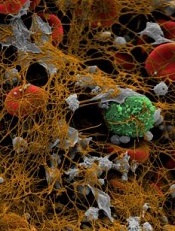
Credit: Andre E.X. Brown
The US Food and Drug Administration (FDA) has again decided not to approve the anticoagulant rivaroxaban (Xarelto) for use in patients with acute coronary syndromes (ACS).
The drug’s developers are seeking approval of rivaroxaban to reduce the risk of secondary cardiovascular events—heart attack, stroke, or death—and to reduce the risk of stent thrombosis in ACS patients.
For both indications, the drug would be given in combination with standard antiplatelet therapy.
This is not the first time the FDA has decided against approving rivaroxaban for use in ACS patients. The agency rejected the drug as prophylaxis for cardiovascular events in June 2012 and March 2013. And the drug was denied approval for stent thrombosis in June 2013.
Nevertheless, it seems the companies developing rivaroxaban—Janssen Research & Development, LLC and Bayer HealthCare—plan to continue pursuing approvals for these indications.
“We remain committed to providing patients who have suffered from acute coronary syndrome with additional protection against stent thrombosis and secondary, life-threatening cardiovascular events,” said Paul Burton, MD, PhD, Vice President, Clinical Development, Janssen Research & Development.
“We are evaluating the contents of the [FDA’s complete response] letters and will determine the appropriate next steps.”
Both applications for expanding rivaroxaban use were based on results from the phase 3 ATLAS ACS 2 TIMI 51 trial, which were published in NEJM in November 2011.
The study showed that rivaroxaban, when given in combination with standard antiplatelet therapy, reduced the composite endpoint of cardiovascular death, myocardial infarction, and stroke in ACS patients, compared to placebo. But rivaroxaban also increased the risk of major bleeding and intracranial hemorrhage.
In past evaluations of rivaroxaban, the FDA and its advisors expressed concerns about data from this trial, particularly the risk of bleeding associated with rivaroxaban and some gaps in trial data.
Although Janssen submitted the missing data, the FDA still had reservations about rivaroxaban’s safety and efficacy in ACS patients. The FDA recently suggested the company limit the proposed duration of rivaroxaban treatment, as the drug might be safer and more effective when given for a shorter period.
So Janssen changed the suggested treatment duration to 90 days. But last month, an FDA advisory committee still recommended against expanding the drug’s indication. And the agency seems to have taken that recommendation to heart.
Rivaroxaban is currently FDA-approved to treat patients with venous thromboembolism (VTE) and to reduce the risk of VTE recurrence following an initial 6-month treatment for acute VTE. The drug is also approved for use as thromboprophylaxis for patients with non-valvular atrial fibrillation, those who have undergone knee replacement surgery, and patients who have had hip replacement surgery.

